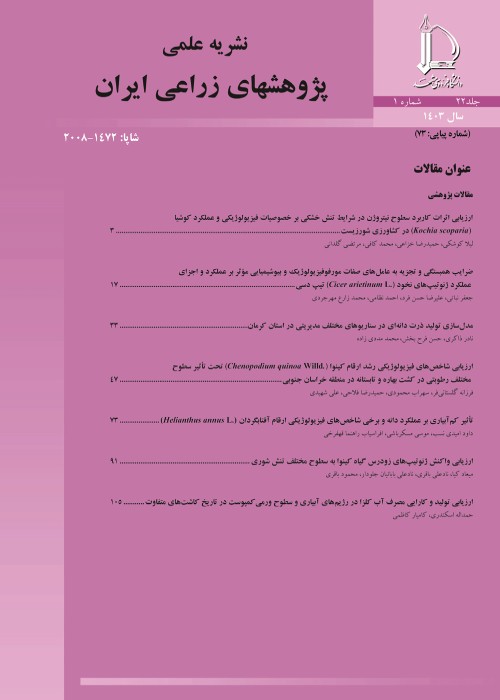Effect of Exogenous Glycine Betaine Application on Physiological and Phenological Traits and Yield of Tomato (Solanum lycopersicum) in Non-stress Condition
Author(s):
Article Type:
Research/Original Article (دارای رتبه معتبر)
Abstract:
Introduction
Glycine Betaine has potential impacts on enhancing the tolerance of plants against various environmental abiotic stresses. There are two methods of increasing Glycine Betaine level in plants in which Glycine Betaine does not accumulate naturally, the exogenous application of Glycine Betaine and the introduction of GB-biosynthetic pathway into plants, via transgenes. When Glycine Betaine is applied to the leaves of tomato plants, most of the Glycine Betaine that is taken up by the leaves is localized in the cytosol which is significantly reduced adverse effects of abiotic stresses (Park et al., 2006). Even in non-stress conditions, there are several environmental factors (water scarcity between irrigation times, soil salinity, mid-day heat, etc.) that can affect the plant yield. This study tried to find the effectiveness of exogenous application of Glycine Betaine on tomato plant in non-stress condition.Materials And Methods
The experimental was conducted in 2015 as the randomized complete block design based on factorial with four replications. Treatments included three levels of Glycine Betaine application level (0, 3, 6 kg.ha-1) and three times of application including planting, floral initiation and fruit set. 0, 3 and 6 kgha-1 Glycine Betaine applied with 200 lit.ha-1 water and applied with back sprayer. The experimental field was located 10 km southeast of Mashhad. Irrigation with 6-day interval was done to represent non-stress condition. Electrolyte leakage, SPAD number and Relative Water Content (RWC) were measured. Dry matter, leaf area, days from planting to flowering, days from flowering to fruit set, total fruit numbers, ripe fruit numbers, green fruit numbers, average fruit size, and total yield were determined during the study. Harvest time was determined by meteorological forecast and before the first freezing stress in fall. The data were analyzed by SAS software and the means were compared by Duncan.Results And Discussion
Results showed that the times of application had significant effects on some measured parameters. Glycine Betaine application at planting stage led to increasing vegetative stage and delayed flowering time for 6 days. The highest leaf area (1464.4 cm2) was also obtained from the same application. Different times of Glycine Betaine application had no significant effects on total yield. However, using at planting time resulted in higher green/total fruit ratio. Evaluation the rate of Glycine Betaine application showed that the highest leaf area (1370 cm2) and the highest dry matter (1206 g.ha-1) were obtained from 3 kg.ha-1 application rate. Treatments without GB application resulted in the highest yield (74.7 ton. ha-1), but increasing the rate from 0 to 3 kg.ha-1, led to 94% increasing in green fruit numbers (8.4 to 16.2 respectively).Conclusions
Exogenous application of Glycine Betaine showed different effects on tomato plants due to time and rate of application. The highest yield was obtained from control treatment (no application) (74 ton ha-1) and 3 and 6 kg.ha-1 applications, decreased yield 15 and 30 percent, respectively. However, the vegetative stage was lengthened and the numbers of green fruits was increased by 3 kg.ha-1 rate. It seems that if the growing season was extended, and enough time was provided to fruit ripening, total yield could be increased by low concentration of Glysine Betaine application up to 25% compared to control. But high rate of Glycine Betaine may cause toxic effects on tomato and reduce the yield.Keywords:
Language:
Persian
Published:
Iranian Journal of Field Crops Research, Volume:16 Issue: 3, 2018
Pages:
683 to 696
magiran.com/p1880232
دانلود و مطالعه متن این مقاله با یکی از روشهای زیر امکان پذیر است:
اشتراک شخصی
با عضویت و پرداخت آنلاین حق اشتراک یکساله به مبلغ 1,390,000ريال میتوانید 70 عنوان مطلب دانلود کنید!
اشتراک سازمانی
به کتابخانه دانشگاه یا محل کار خود پیشنهاد کنید تا اشتراک سازمانی این پایگاه را برای دسترسی نامحدود همه کاربران به متن مطالب تهیه نمایند!
توجه!
- حق عضویت دریافتی صرف حمایت از نشریات عضو و نگهداری، تکمیل و توسعه مگیران میشود.
- پرداخت حق اشتراک و دانلود مقالات اجازه بازنشر آن در سایر رسانههای چاپی و دیجیتال را به کاربر نمیدهد.
In order to view content subscription is required
Personal subscription
Subscribe magiran.com for 70 € euros via PayPal and download 70 articles during a year.
Organization subscription
Please contact us to subscribe your university or library for unlimited access!


